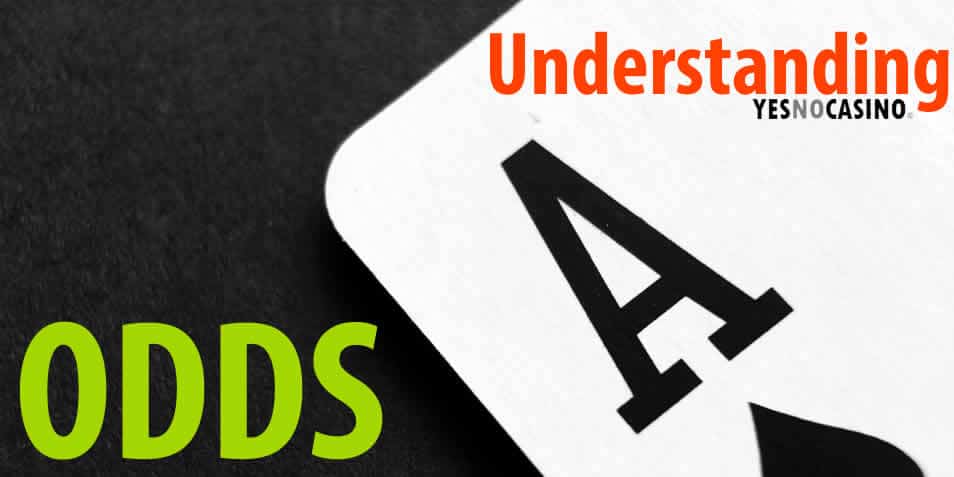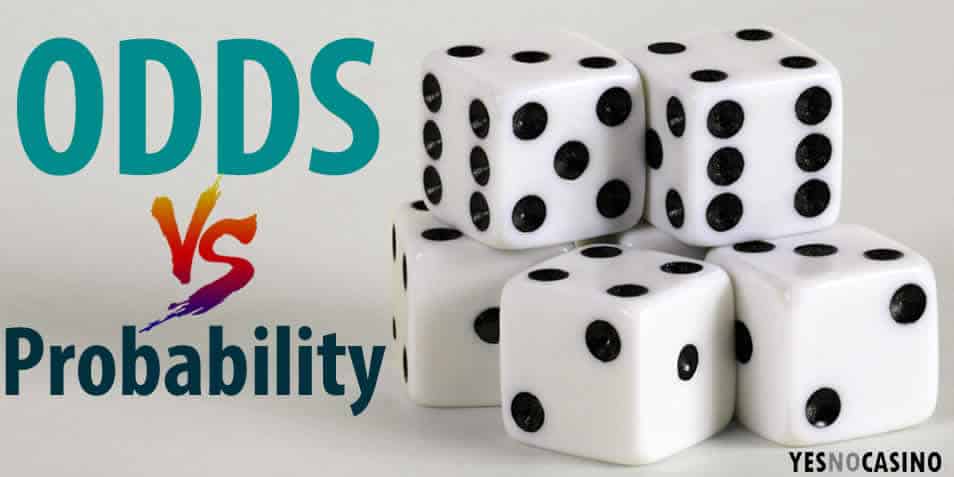
Knowing the odds is an essential part of gambling. It doesn’t matter if you’re a fresh-faced beginner or a seasoned player. From a simple bet on the flip of a coin to the most complicated multiway bets, the odds are what determine how often you’ll win, how much you can win, or if you can win at all.
To put it simply, odds are a mathematical representation of the number of favourable outcomes (you win) for a given situation versus the number of unfavourable outcomes (you lose). The gambling odds for most casino games are displayed as a simple ratio such as 1:5 or 1/5.
It’s important to note that you have to add both numbers together to get the total number of possible outcomes. In the example above, for instance, odds of 1:5 mean that there are 6 total possibilities.
Many novice players make the mistake of thinking that odds of 1:5 mean you have a 1 in 5 chance of winning. In this case, the player actually has a 1 in 6 chance of winning — 1 way to win and 5 ways to lose, for a total of 6. Misinterpreting your odds of winning can lead to disastrous results, especially if you make many bets over a long period of time.
How To Calculate Basic Gambling Odds
Calculating the basic odds for any particular event is not very complicated. It’s really just a matter of simple math.
- Determine how many winning outcomes exist. Let’s use a common six-sided die as a simple example that everyone is familiar with. We’ll say that we’re going to bet that the next roll of the die will come up either a one or a six. This gives us two possible results where we win.
- Determine how many losing outcomes exist. If a result of one or six wins, then a result of two, three, four, or five will lose. Thus, we have four possible losing outcomes.
- Combine the results for your numerical odds. The most common format used to numerically represent gambling odds is the number of favourable outcomes followed by the number of unfavourable outcomes, separated by a colon. Continuing our example, this would lead us to a result of 2:4.
Going back for a moment to your secondary school math class, odds can be reduced in the same way as common fractions. So our odds of 2:4 can be further reduced to 1:2. To put it another way, each time we make this bet, for every one possible winning outcome, we have two possible losing outcomes.
- Calculating the odds against an outcome. The previous steps explain how to calculate the odds of any specific event occurring. If you want to know the odds against an event occurring, all you have to do is reverse the numbers in the ratio. In the case of our example, you would have 2:1 odds that you would NOT win.
The Relationship Between Odds And Probability

Although the two are closely related, it’s important to understand that odds and probability are not the same thing. Where odds give us the total number of good and bad outcomes, probability simply tells us the chance we have to win out of 100%.
Calculating Probability When You Know The Odds
The probability of winning is calculated by dividing the number of winning outcomes by the total number of possible outcomes. Going back to our six-sided die example once more, we would calculate our probability of winning by dividing 2 by 6 (or 1 by 3 if we reduce the ratio), which equals .33, or 33%. So in our example, we have a 33% chance of winning each time we bet and roll the die.
Calculating Odds When You Know The Probability
If you know the probability of winning, you can also calculate the odds quite easily. First, convert the percentage to a fraction. 33%, for example, would be 1/3. Then subtract the numerator (1) from the denominator (3). This gives you the total number of losing outcomes — 2 in this case. The numerator then becomes the winning side of our odds, giving us 1:2.
Gambling Odds And Payout Odds
One extremely important aspect of gambling is understanding the difference between your odds of winning and the payout odds that an online casino gives on any particular bet. The two are never the same.
Let’s use roulette as an example and say that we’re going to place a single bet on a single number to win. Depending on where you play, a roulette wheel has either 37 or 38 numbers — 1 through 36 plus 0 and sometimes 00.
For our purposes, it’s not really important which variant we are playing. We’ll just say that we’re playing at a table with 38 numbers on the wheel. So, placing a bet on a single number to win, we have odds to win of 1:37 (1 winning outcome and 37 losing outcomes). If you look at the payout odds of most casinos, however, you’ll see that they pay 35 to 1 (35 times the amount of your wager) when you win this bet.
In order to break even over time when making repeated bets, the payout odds must be the same as the odds of winning. To actually make a profit, the payout odds must be higher than the odds of winning. If the payout odds are lower than your odds of winning, it is a mathematical certainty that you will lose money over time as you continue to bet. This, of course, is how casinos make their money. Those small differences in the payout odds are what generate revenue for casinos over thousands upon thousands of bets from players.
Your Odds Never Change
Another very important thing about gambling odds that every player should understand is that they never change (when a game is truly random). Many people think that if they have a particularly bad run of losing bets that they are somehow more likely to hit a winner as they accumulate more losses. This is simply not true.
The best way to visualize this is to think of flipping a coin. Your odds on a coin flip are 1:1. There is always one winning outcome and one losing outcome. This, however, doesn’t mean that if you keep flipping the coin you will get a pattern of heads, tails, heads, tails, etc. This also doesn’t mean that if you flip the coin and get heads ten times in a row you are somehow more likely to get tails on the eleventh flip. The odds are always the same, 1:1. If you got a 1:1 payout on your coin flips, you would eventually break even over time, no matter how many times you might “run hot” or “run cold”.
The same holds true for any game of chance. You always have the same chance of picking the winning number on the spin of a roulette wheel or being dealt any card or combination of cards from a freshly shuffled deck. In a truly random game of chance, every result is independent. The outcome of one game is not influenced by the one before it, nor will it influence the one to come after it. The odds never change.
To get the most out of your time at the casinos, make sure you know your odds of winning and always compare them to the payout odds you’re receiving. When you know what to look for, you can quite possibly turn losing sessions into winners. At the very least, you’ll be able to maximize your bankroll and get more time and fun out of your favourite casino games. Remember, not all casinos have the same payouts. Shop around and see which offer the best benefits for the games you play.